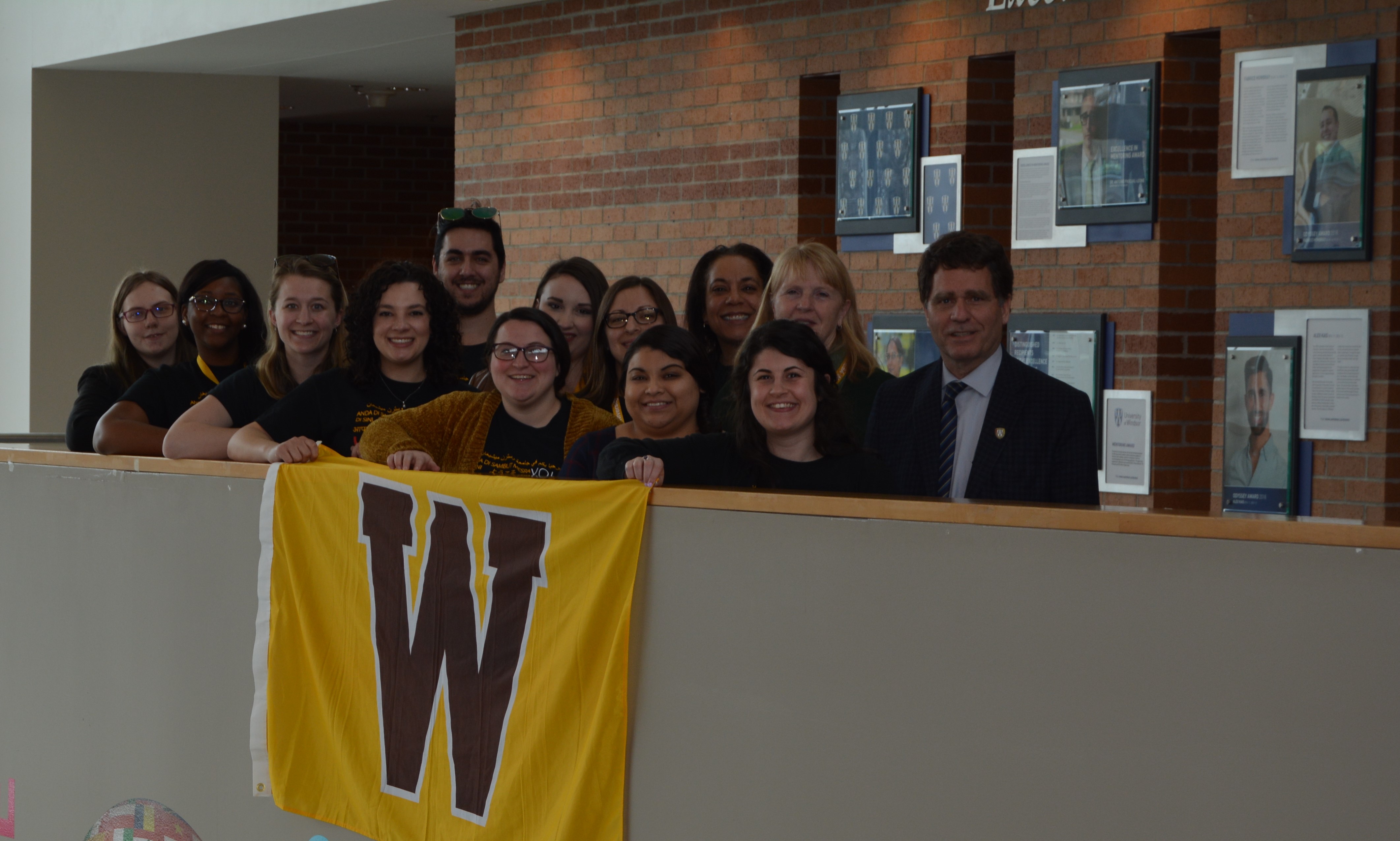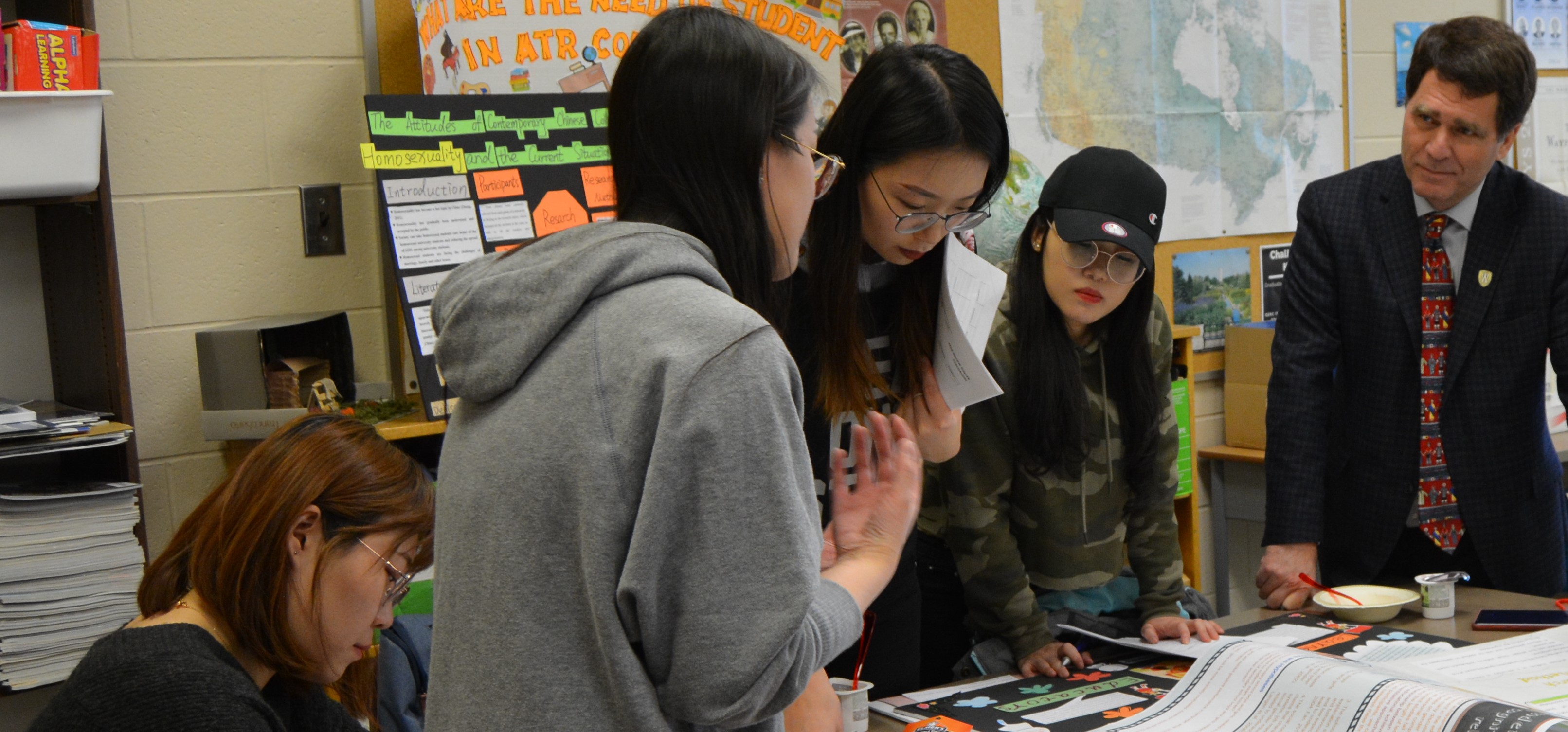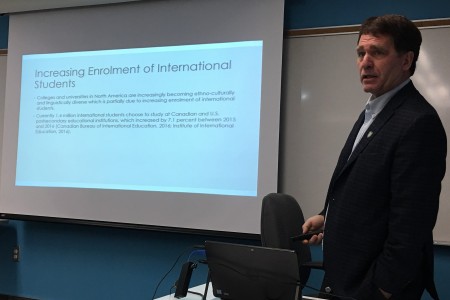Home » International (Page 2)
Category Archives: International
Crossing the Border

This week I, along with Windsor colleagues (Dr. Ken Montgomery, Dean, Faculty of Education; Ryan Flannagan, Associate Vice-President, Student Experience), welcomed graduate students and faculty to the University of Windsor from Western Michigan University’s Higher Education and Student Affairs Leadership program during their study abroad trip through Ontario. As a dual citizen (both US and Canadian), it was my pleasure to share a bit about Canadian higher education.
As Canadians often do, we opened our dialogue on the state of the weather, which was 9 degrees Celsius and with a forecast of light snow mixed with rain. Keep in mind this was April 10th! We then talked about geography. Some were surprised that they had traveled south as they came into Canada and that Windsor is the southern most part of Canada, with a good portion of the US north of us.
I was, of course, glad to see some adventurous students try poutine in our cafeteria, a made-for-students delicacy composed of fresh-cut french-fries topped with cheese curds and gravy. They loved it!
The visiting students and faculty were very interested in the similarities and differences between the educational systems and the challenges and opportunities facing the Canadian and Ontario higher education systems. This, of course, led to some discussion of the political system in Canada since higher education is mostly funded and controlled by the provinces.
Our conversation touched on many topics, but two were of particular interest: international education and student mental health.
On international education, we discussed the growing international student population on Canadian campuses, including the University of Windsor, and the stalled and declining enrolment of international students at many American colleges and universities.
Mental health for both American and Canadian institutions is a growing concern. Some were surprised to learn that mental health support at our campus is greater than it is in the community.
We then took a short tour of our student services, snapped a picture, and wished them well as they travelld to other Ontario colleges and universities.
My guess is they will head home with a richer understanding of Canadian higher education and a sense of some of the things we can do together in the years to come.
A pleasure!
Clayton Smith
Potluck, Posters, & Loads of Fun

For the past few semesters, I have ended my smaller classes with potluck food and beverage sharing, a poster fair, and a chance to end the semester with loads of fun. I thought I’d share a bit about this in case this may be something other teachers might want to try.
The students plan the potluck. I just ask that they try to mix it up a bit so we don’t get all chips and poutine! This year students brought food items in from their home culture, as well as what could readily be found in nearby bakeries and grocery stores. What is important is that everyone contribute. The added benefit is that there is almost always food left over, and this results in the sharing continuing even after class finishes. I see the potluck as a key outcome of the course. Students will engage with each other (and me!) around the potluck table in some wonderfully engaging ways.
The poster fair is a great match for any class in which a major project is completed. I have done it for my Research in Education Class, a first-year graduate level class in which students prepare a research proposal. Students in my Theories of Individual and Collective Learning, an undergraduate course in our Minor in Organizational Learning and Teaching, also prepare posters. During the poster fair, students listen to each other’s poster presentations and provide peer review at the end, including an opportunity to engage collectively in a topic of the individual students’ choice. It is a great reflective experience that provides students with a truly authentic learning experience.
The loads of fun part comes as we engage each other, take a class photo, and then assemble an end-of-class mind map on the class topic. Lots of moving around, wonderful smiles, and a chance to put the course into practice.
You might think this approach is best with one type of student or class. Actually, it works for undergraduate and graduate classes. Size matters, with the best results being when the students know each other. But my guess is it could also work in a larger class. Maybe I will try that next year!
Clayton Smith
Using Mentimeter to Discuss Current Educational Issues
In my Teaching and Learning, Part 1 class (EDUC119B), I recently used Mentimeter (www.menti.com) in a large class (110 students), which meets in our large lecture hall in the Education Building. This class is recorded for students unable to make class.
Students created a class-wide word cloud in response to the question, “what are the current educational issues facing teachers today? This was done as a follow-up to a guest lecture presented by Dr. Lyndsey Jaber, a school psychologist with the Greater Essex County District School Board, on the topic “Bullying: Definition and Implications.”
They then held two group discussions that included: a) identify the top 5 issues facing teachers today and indicate your reason for selected these iss

ues, and b) select one of your issues and discuss how you would handle this issue during your classroom observation. A short Blackboard quiz was used to assess student learning.
Here is a link to the word cloud students created, which I subsequently posted to our Blackboard course page.
After being empowered by Dr. Jaber’s presentation, students were able to bring it into their area of interests by way of the creation of the Mentimeter word cloud and the subsequent discussions we had during the second part of class. What made this work particularly well was the speed by which the cloud developed and the observation that others in the class picked some of the same issues, which led to the group discussions that followed. So rather than lecturing about the educational issues facing teachers, the class was able to discover these issues and then share their thoughts about the top vote getters. Very powerful and impactful!
Probably the only issues we faced were that not everyone had a phone or laptop so some students partnered up, and the focus of the group discussions were probably impacted by the extroverts in the group, and may have resulted in some students not weighing in on their top issues of concern.
In reflection, when I do this again I am thinking about asking students to write a one minute essay on an issue they believe strongly about, which they can upload to Blackboard during class. That way I can be sure to give voice to all students on this important topic.
Clayton Smith
Recent Comments